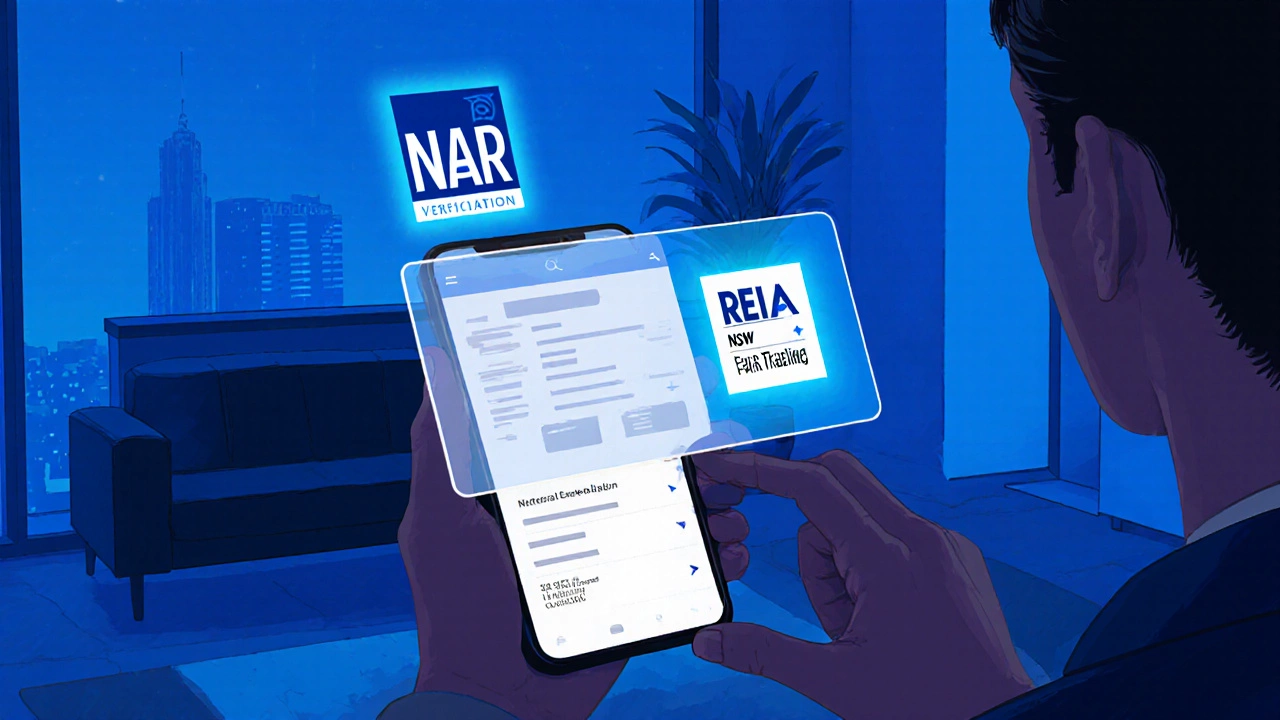REALTOR Verification Tool
Verify REALTOR Status
Ever heard someone say they’re a REALTOR and wondered if that’s different from a regular real estate agent? It’s not just a fancy title-it’s a legal distinction with real consequences for how they work, what they’re held accountable to, and how they serve you. If you’re buying or selling property, knowing the difference can save you time, money, and stress.
The Simple Truth: All REALTORS Are Agents, But Not All Agents Are REALTORS
A real estate agent is anyone licensed by the state to help people buy, sell, or rent property. That’s it. They pass a test, get a license, and can legally represent clients in transactions. In Australia, this means holding a Certificate of Registration or a full Real Estate Agent Licence depending on the state.
A REALTOR, on the other hand, is a real estate agent who also belongs to the National Association of REALTORS (NAR) in the United States. Yes, this is a U.S.-specific term. If you’re in Sydney, Melbourne, or Brisbane, you won’t hear locals use “REALTOR” much-it’s an American branding tool. But if you’re working with an agent who uses that title, they’re making a deliberate claim about their professional standards.
Think of it like this: All BMWs are cars, but not all cars are BMWs. The REALTOR title adds a layer of ethics, training, and accountability that goes beyond basic licensing.
What Does NAR Membership Actually Mean?
The National Association of REALTORS isn’t just a club. It’s the largest trade association in the U.S., with over 1.5 million members. To join, agents must agree to abide by the NAR’s Code of Ethics-a 17-article set of rules that’s stricter than most state licensing laws.
Here’s what that looks like in practice:
- They must disclose all known material facts about a property-even if the seller doesn’t want them to.
- They can’t misrepresent property conditions or lie about competing offers.
- They’re required to treat all parties honestly, regardless of who’s paying them.
- They must complete ethics training every two years to keep their membership.
Real estate agents who aren’t REALTORS aren’t breaking any laws if they skip these standards. State licensing boards enforce minimum legal requirements, but they don’t police ethics the way NAR does. That’s why a REALTOR can be disciplined-or even lose their membership-for behavior that wouldn’t get a regular agent in trouble with the state.
Why It Matters When You’re Buying or Selling
Let’s say you’re selling your home in Chicago. You find two agents: one calls themselves a REALTOR, the other just says they’re a licensed agent. Both can list your house. But here’s where the difference shows up:
- The REALTOR will likely use the Multiple Listing Service (MLS) more thoroughly. Only NAR members have full access to MLS databases, which means your listing reaches more buyers.
- If a buyer’s agent is a REALTOR, they’re obligated to disclose if they’ve seen a better offer elsewhere-even if their client didn’t ask.
- If you feel misled, you can file a formal ethics complaint with NAR. That process can lead to fines, mandatory training, or suspension. A regular agent? You’d need to go through your state’s real estate commission, which is slower and less consistent.
In Australia, where the term REALTOR isn’t legally protected, some agents use it to sound more professional. But there’s no NAR oversight here. So if you’re in Sydney and someone calls themselves a REALTOR, ask: “Are you a member of the National Association of REALTORS?” If they say yes, they’re probably based in the U.S. or have international ties. If they say no, they’re just using the word for marketing.

What You Should Look For Instead of the Title
Don’t fixate on the word REALTOR. Focus on what actually protects you:
- License status: Check their license on your state’s real estate regulator website (e.g., NSW Fair Trading in Australia, or your state’s real estate commission in the U.S.).
- Experience: Ask how many homes they’ve sold in your neighborhood in the last year. Look for specific numbers, not vague claims like “I’m very experienced.”
- References: Request contact info for two recent clients. Call them. Ask if the agent was responsive, honest, and kept them informed.
- Written agreement: Never work with someone who won’t give you a signed agency agreement. It should clearly state whether they’re representing you (buyer’s agent) or the seller.
In Australia, real estate agents are regulated by state bodies like NSW Fair Trading, Consumer Affairs Victoria, or the Real Estate Institute of Australia (REIA). Membership in REIA is voluntary and doesn’t carry the same ethical enforcement as NAR. So if you’re in Australia, focus on state licensing, not U.S.-based titles.
Red Flags to Watch For
Whether someone calls themselves a REALTOR or just an agent, here are signs they’re not right for you:
- They promise to “get you the highest price” without showing recent comparable sales.
- They pressure you to sign quickly or say “this offer won’t last.”
- They refuse to show you their license number or avoid answering questions about their process.
- They say they’re “the best” without data to back it up.
Real estate is emotional. Good agents help you stay calm. Bad agents exploit stress. The REALTOR title doesn’t guarantee competence-but the NAR Code of Ethics does create a higher standard. In places where it’s enforced, it gives you a clear path to hold someone accountable.

Does the REALTOR Title Add Value Outside the U.S.?
In Australia, Canada, the UK, or other countries, the term REALTOR has no legal meaning. Some agents use it to imply U.S. training or global standards. But unless they’re licensed in the U.S. and active in NAR, it’s just branding.
What matters more here is:
- Are they a licensed agent under your state’s laws?
- Do they have a clear, written process for marketing and negotiating?
- Are they transparent about fees and commissions?
- Do they use technology like virtual tours, digital contracts, or automated market reports?
Some Australian agents are certified by REIA or hold advanced qualifications like Certified Property Manager (CPM) or Certified Residential Specialist (CRS). These are more relevant locally than “REALTOR.”
Bottom Line: Choose Based on Actions, Not Labels
The REALTOR title is a U.S.-specific credential tied to ethics training and MLS access. Outside the U.S., it’s mostly marketing. What you need is a licensed, experienced agent who communicates clearly, acts in your best interest, and can prove it with results.
Don’t assume a REALTOR is better. Don’t assume a regular agent is worse. Ask the right questions. Check their license. Read their reviews. See how they handle a tough negotiation. That’s what actually determines whether they’ll help you succeed-not the letters after their name.
Is a REALTOR better than a real estate agent?
Not necessarily. A REALTOR is a real estate agent who belongs to the National Association of REALTORS (NAR) and follows its Code of Ethics. That means they’re held to higher standards of honesty and transparency, especially in the U.S. But in Australia and other countries, the term has no legal meaning. What matters most is whether the agent is licensed, experienced, and acts in your best interest-not whether they use the word REALTOR.
Can a real estate agent call themselves a REALTOR in Australia?
Yes, but it’s misleading. The term REALTOR is a registered trademark of the National Association of REALTORS in the United States. In Australia, anyone can use it, but it doesn’t mean they’re a member of NAR or bound by U.S. ethics rules. If an agent in Sydney calls themselves a REALTOR, ask if they’re actually registered with NAR. If they’re not, they’re using the term for marketing, not because they meet the standard.
Do REALTORS charge higher fees?
No. REALTORS don’t charge more than other agents. Commission rates are set by market conditions and individual agreements, not by NAR membership. In fact, many REALTORS compete aggressively on price because they rely on reputation and repeat business. The difference isn’t cost-it’s accountability and access to tools like the MLS.
How do I verify if someone is a REALTOR?
Go to the official NAR website (realtor.org) and use their “Find a REALTOR” tool. You can search by name, location, or license number. If they’re listed there, they’re a current member. If you’re in Australia, check your state’s real estate licensing authority (e.g., NSW Fair Trading) to confirm their local license is active.
What should I look for in an agent if I’m in Australia?
Look for a licensed agent registered with your state’s regulatory body. Ask for their license number and verify it online. Check how many properties they’ve sold in your suburb in the last year. Ask for references. Make sure they provide a written agency agreement and explain their marketing plan. Membership in the Real Estate Institute of Australia (REIA) is a bonus, but not a substitute for licensing and experience.



